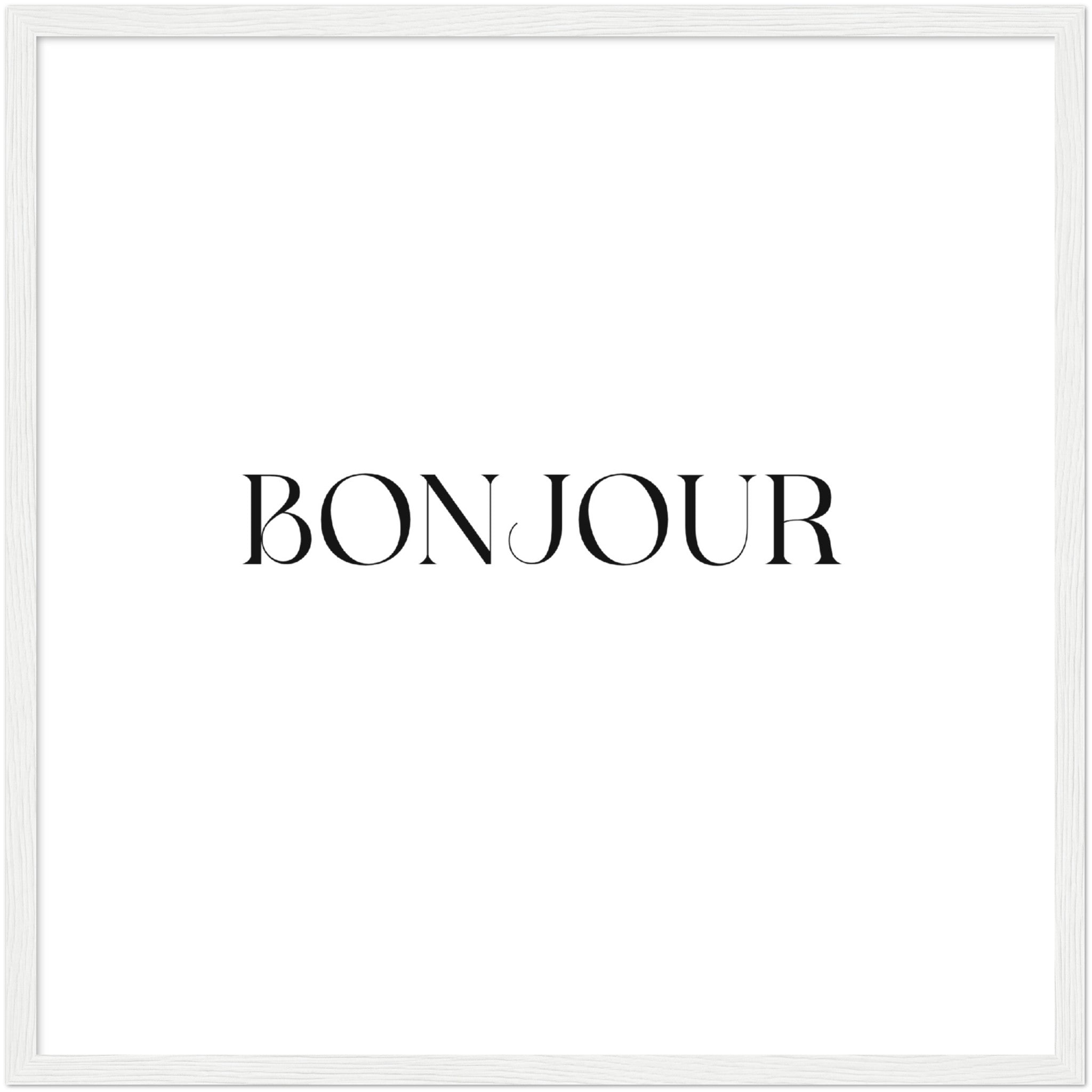Bonjour En Tunisie: A Warm Welcome To The Land Of Sands And Stories
When you step into Tunisia, the first thing you'll hear is "Bonjour!" Yes, bonjour en Tunisie is more than just a greeting—it's a cultural bridge that connects French-speaking visitors with this vibrant North African country. Imagine yourself walking through the bustling souks of Tunis or gazing at the stunning coastline, and someone greets you with a warm "Bonjour." It's not just a word; it's an invitation to explore, connect, and experience the rich tapestry of Tunisian culture.
Tunisia, with its blend of Mediterranean charm and African soul, has a unique linguistic landscape. While Arabic is the official language, French plays a significant role in daily communication, especially in urban areas. Bonjour en Tunisie isn't just a phrase; it's a gateway to understanding how this nation seamlessly blends its past with its present.
So, whether you're planning a trip or simply curious about the cultural nuances of Tunisia, this article will take you on a journey through the meaning of "Bonjour" in Tunisia, its historical context, and how it shapes the country's identity today. Let's dive in, shall we?
Table of Contents
- The Historical Roots of Bonjour in Tunisia
- The Language Landscape in Tunisia
- Bonjour En Tunisie: A Cultural Perspective
- Travel Tips for Saying Bonjour in Tunisia
- Etiquette When Using Bonjour in Tunisia
- Bonjour En Tunisie: Boosting Tourism
- Bonjour En Tunisie: A Taste of Local Cuisine
- Bonjour En Tunisie: The Music Scene
- Bonjour En Tunisie: Art and Architecture
- The Future of Bonjour En Tunisie
The Historical Roots of Bonjour in Tunisia
Tunisia's linguistic journey is as colorful as its landscapes. The phrase "Bonjour en Tunisie" didn't just appear overnight. It has deep historical roots that trace back to the French protectorate era, which lasted from 1881 to 1956. During this period, French became an integral part of Tunisian life, influencing education, commerce, and even social interactions.
French wasn't just imposed; it was embraced. Many Tunisians saw it as a way to access global opportunities and modernize their society. This acceptance laid the foundation for the widespread use of "Bonjour" today. But don't get me wrong, Tunisians haven't lost their cultural identity. They've blended French with Arabic and Berber influences to create a unique linguistic mosaic.
So, when you say "Bonjour" in Tunisia, you're not just greeting someone; you're acknowledging a rich history of cultural exchange and adaptation. It's like shaking hands with the past while looking forward to the future.
The Language Landscape in Tunisia
Tunisia is a melting pot of languages. While Arabic is the official language, French is widely spoken, especially among the educated and in urban areas. This dual-language environment means that "Bonjour en Tunisie" isn't just a phrase; it's a reflection of the country's linguistic diversity.
How French Influenced Tunisian Arabic
French has left a lasting impact on Tunisian Arabic, known locally as Derja. You'll notice French loanwords sprinkled throughout everyday conversations. For instance, "Bonjour" is often used alongside "Salam" or "Ahlan" to greet someone. This linguistic fusion is a testament to Tunisia's adaptability and openness to external influences.
But it's not all about French. Berber languages, though less prevalent, still hold cultural significance, especially in rural areas. This linguistic diversity makes Tunisia a fascinating case study for language enthusiasts.
Bonjour En Tunisie: A Cultural Perspective
Understanding the cultural context of "Bonjour en Tunisie" is crucial. In Tunisia, greetings are more than just words; they're a form of respect and hospitality. When you say "Bonjour," you're not just acknowledging someone's presence; you're showing respect for their dignity and worth.
Let me give you a real-life example. Imagine you're in a small café in Sidi Bou Said, and you greet the waiter with a cheerful "Bonjour." Chances are, you'll get a warm smile and a friendly chat in return. That's the power of a simple greeting in Tunisia. It opens doors and builds connections.
But it's not just about the words. The tone and sincerity behind "Bonjour" matter too. Tunisians appreciate genuine interactions, so make sure your greeting comes from the heart.
Travel Tips for Saying Bonjour in Tunisia
Planning a trip to Tunisia? Here are some tips to help you use "Bonjour" effectively:
- Learn Basic Phrases: Knowing a few key phrases like "Bonjour," "Merci," and "Au revoir" can go a long way in making a good impression.
- Be Polite: Always accompany your "Bonjour" with a smile and eye contact. It shows respect and friendliness.
- Adapt to the Situation: In formal settings, stick to "Bonjour." In informal gatherings, you might use "Salut" instead.
Remember, Tunisians are warm and welcoming. They'll appreciate your effort to speak their language, even if you make a few mistakes. It's all about the intention.
Etiquette When Using Bonjour in Tunisia
Etiquette plays a significant role in how "Bonjour" is used in Tunisia. Here are some dos and don'ts:
Do's
- Always greet elders first. It's a sign of respect.
- Use "Bonjour" in the morning and early afternoon. For evening greetings, switch to "Bonsoir."
- Be mindful of cultural differences. What might seem casual to you could be considered rude in Tunisia.
Don'ts
- Don't rush your greetings. Take a moment to acknowledge the person properly.
- Avoid using slang or informal versions of "Bonjour" in formal settings.
- Don't assume everyone speaks French. While it's widely understood, Arabic is still the primary language.
Following these guidelines will help you navigate social interactions smoothly and make a positive impression.
Bonjour En Tunisie: Boosting Tourism
Tunisia's tourism industry benefits greatly from the widespread use of "Bonjour." Visitors from France and other French-speaking countries feel right at home when greeted in their native language. This linguistic advantage makes Tunisia an attractive destination for travelers seeking a familiar yet exotic experience.
Moreover, the use of "Bonjour" in tourism marketing campaigns helps create a welcoming image of Tunisia. It signals that the country is open, friendly, and eager to accommodate international visitors. This positive perception translates into increased tourist arrivals and economic benefits for the country.
Bonjour En Tunisie: A Taste of Local Cuisine
Food is an integral part of Tunisian culture, and "Bonjour" often accompanies meals. Whether you're dining in a high-end restaurant or enjoying street food, a friendly greeting can enhance your culinary experience.
Tunisian cuisine is a delightful mix of flavors influenced by Arabic, Berber, Turkish, and French traditions. Dishes like couscous, brik, and lablabi are must-tries for any visitor. And guess what? Saying "Bonjour" to the chef or waiter might just earn you a complimentary dessert!
Bonjour En Tunisie: The Music Scene
Tunisian music, like its language, is a blend of diverse influences. Traditional Arab-Andalusian music coexists with modern genres like hip-hop and pop. Many Tunisian musicians incorporate French lyrics into their songs, further cementing the role of "Bonjour" in the cultural landscape.
Attending a live music event in Tunisia is a great way to experience the local scene. You might hear "Bonjour" echoed in the lyrics, connecting you to the audience and the performers. It's a reminder that music, like language, knows no boundaries.
Bonjour En Tunisie: Art and Architecture
Tunisian art and architecture reflect the country's rich cultural heritage. From the stunning mosaics of Carthage to the vibrant street art of Tunis, there's something for every art enthusiast. And yes, you'll hear "Bonjour" in art galleries and museums, where friendly staff are eager to share their knowledge.
Architecture in Tunisia is equally fascinating. The medinas, with their narrow streets and colorful buildings, are a testament to the country's historical significance. Greeting the locals with a "Bonjour" as you explore these historic sites can lead to fascinating conversations and insights.
The Future of Bonjour En Tunisie
As Tunisia continues to evolve, the role of "Bonjour" in its cultural fabric remains significant. With increasing globalization and tourism, the use of French is likely to persist, albeit alongside other languages like English.
However, Tunisians are also embracing their Arabic roots more strongly. This linguistic balance ensures that "Bonjour en Tunisie" remains a symbol of cultural diversity and adaptability.
Predictions for the Next Decade
- Increased use of multilingual greetings to cater to a global audience.
- Greater emphasis on preserving local dialects and languages.
- Continued blending of French and Arabic in everyday communication.
So, whether you're planning a visit or simply intrigued by Tunisia's linguistic landscape, "Bonjour en Tunisie" offers a glimpse into a dynamic and evolving culture.
Conclusion
In conclusion, "Bonjour en Tunisie" is more than just a greeting; it's a cultural bridge that connects people, past, and present. From its historical roots to its role in tourism, this simple phrase encapsulates the essence of Tunisia's linguistic and cultural diversity.
I encourage you to visit Tunisia and experience the warmth and hospitality firsthand. Say "Bonjour" to the locals, try the delicious food, and immerse yourself in the vibrant culture. And don't forget to share your experiences with us in the comments below. Who knows? Your story might inspire others to embark on their own Tunisian adventure!



Detail Author:
- Name : Gustave Strosin
- Username : khalid.padberg
- Email : alvena23@jast.com
- Birthdate : 1988-09-09
- Address : 7689 Monahan Station Apt. 586 East Samanthaton, AL 76006
- Phone : +1.520.916.6176
- Company : Dietrich PLC
- Job : Private Household Cook
- Bio : Pariatur amet vel ut reiciendis praesentium perferendis quaerat. Dolore veritatis voluptates dolor quos tenetur. Veniam labore qui reiciendis eos.
Socials
tiktok:
- url : https://tiktok.com/@noemi.o'connell
- username : noemi.o'connell
- bio : Est voluptate est tenetur. Consequatur rerum inventore aliquid numquam.
- followers : 4830
- following : 162
twitter:
- url : https://twitter.com/no'connell
- username : no'connell
- bio : Eveniet laudantium rerum et ipsam. Voluptas architecto et molestiae possimus sit officiis dolorem rerum. Sint minima odio ipsa ex. In repellendus ipsa fuga et.
- followers : 5359
- following : 1510
instagram:
- url : https://instagram.com/noemi_id
- username : noemi_id
- bio : Velit quis veritatis quo consequatur. Consequatur repudiandae et sunt hic suscipit.
- followers : 4431
- following : 844
facebook:
- url : https://facebook.com/o'connelln
- username : o'connelln
- bio : Sed aut ad perferendis natus quis. Sed reiciendis voluptatem animi dolorem.
- followers : 2910
- following : 2400
linkedin:
- url : https://linkedin.com/in/noemi_o'connell
- username : noemi_o'connell
- bio : Accusantium aut facere odio rerum et quae at.
- followers : 2693
- following : 2207